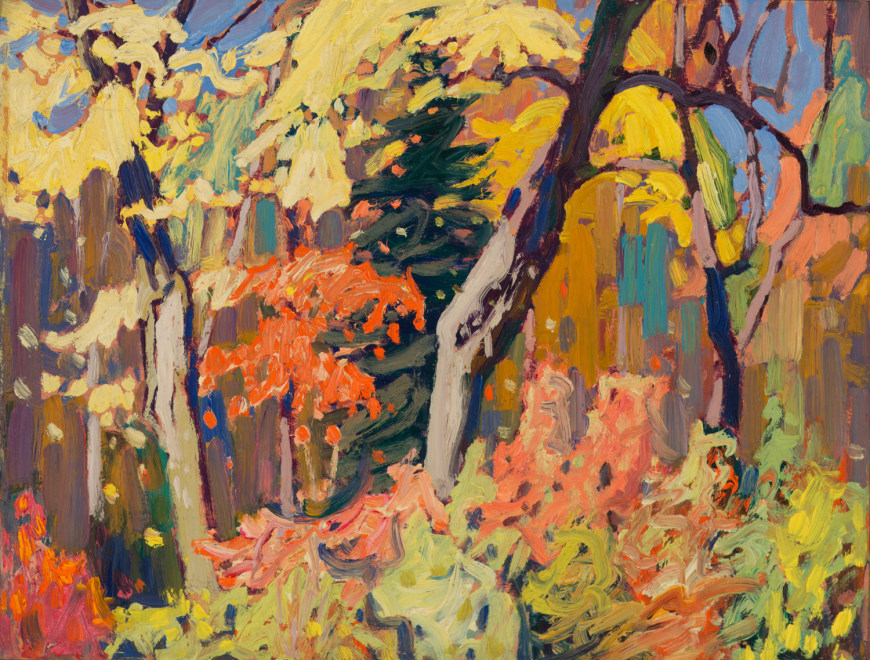-
Artworks
Lawren S. HarrisAlgoma Sketch XLIII, 1920-1921 (circa)1885-1970Oil on board10 3/4 x 14 in
27.3 x 35.6 cmSoldInscriptions
inscribed in ink by Doris Mills, ‘Algoma sketch XLIII / Lawren Harris / 10 ¾ x 14’ (verso, top centre); inscribed in black crayon, ‘2/43’ (verso, upper centre); inscribed in felt marker, cross in circle (verso, upper left)Provenance
Sotheby Parke Bernet, Toronto (Canada) Inc., 26-27 May 1981, lot 100;
The Collection of Mitzi and Mel Dobrin.
Exhibitions
Toronto, Alan Klinkhoff Gallery, Lawren Harris & Canadian Masters: Historic Sale Celebrating Canada's 150 Years, April 1, 2017.
Literature
The paintings of Lawren Harris compiled by Mrs. Gordon Mills, July-December 1936, as Algoma Sketch XLIIIHarris painted in Algoma every year from 1918 to 1921, new travelling arrangements being made in 1919. "The Algoma Central converted an old box-car into suitable living quarters, put in a few windows, four bunks, a stove, water tanks, sink, cupboard, two benches, and a table. We carried a one-man handcar inside for use up and down the tracks - two of us could manage to ride on it - and a canoe for use on the lakes and rivers. A freight train would haul us up the line, and leave the box-car on a siding at Batchewana or in the Algoma Canyon for a week or ten days. Then, on instructions, another freight would pick us up and haul us to another siding."
Arthur Lismer joined Harris, Jackson and MacCallum in May 1920 and Harris, Johnston, MacDonald and Jackson painted at Mongoose Lake in the fall of 1920. Jackson wrote to Catherine Breithaupt in Boston on 17 January 1921, "We only had a half day of rain on our whole trip … a more wonderful autumn there never was. We nearly went crazy. Some people would say we wouldn't have far to go."
Harris painted a large number of oil sketches on these Algoma trips that bear witness to the variety of responses to the region's varying landscapes, lights and colours. The three Algoma sketches in this collection all differ in colour, light and mood. Hubert (Algoma Sketch) of 1918 is characterized by a structured solemnity, Algoma (Beaver Swamp) by a sombre coolness, while Algoma Sketch XLIII is a splash of autumn colour. The dense foliage is framed by the two larger tree trunks that are illuminated by a play of light and shadow, while the dramatically brushed greens, pinks, reds and yellows surround the stolid dark fir in the centre. Rich, blue sky pierces the dense foliage upper right and left. The subject and the density of the composition recall Tom Thomson's sketches of wood interiors of 1915-1916 but painted with a more animated and spontaneous brush. It is a hymn of praise to the colour and light of the northern autumn landscape.
Harris infrequently titled his oil sketches and rarely dated them. This work could be one of the several Wood Interiors or Autumn Woods, Algoma he exhibited in the early 1920s. Yet these numerous studies of wood interiors were only worked up into one canvas, Autumn, Algoma of 1920 in the collection of Victoria College at the University of Toronto, his preference being for more austere and open compositions.
The title of this sketch comes from an inventory prepared by Mrs. Gordon Mills, later Doris Speirs, in 1936. Harris had divorced his wife in 1934 and married Bess Larkin the former wife of his friend Fred Housser. The divorce created considerable tensions in the conservative Toronto society so Lawren and Bess Harris moved to New Hampshire. Doris Mills, a friend of Bess Harris, offered to inventory all the unsold oil sketches and canvases Lawren Harris had left in Toronto. Numerical titles were given to all works and, in the absence of inscribed titles, the numerical appellations have been retained for most. The manuscript inventory, now in the Library and Archives of the National Gallery of Canada, was partially illustrated by a Danish artist, Hans Jensen, a temporary resident in the Studio Building. But unfortunately he didn't get around to illustrating the Algoma sketches, of which 148 were listed.
Charles C. Hill





